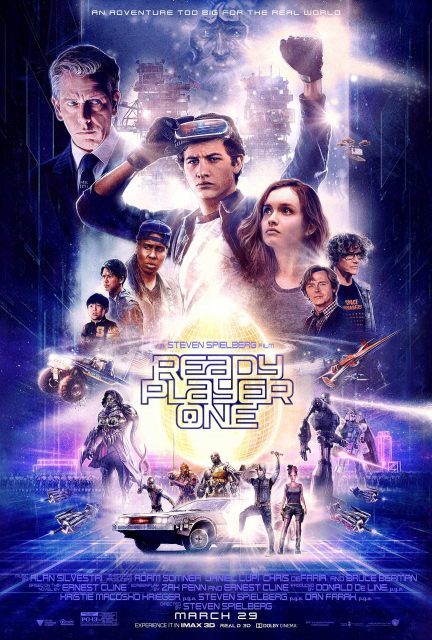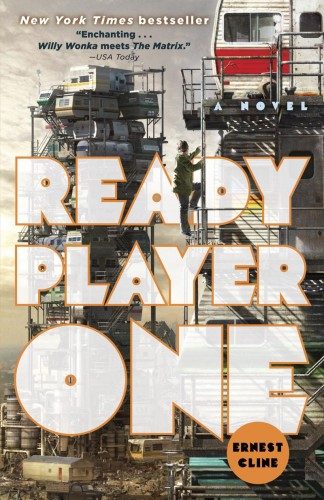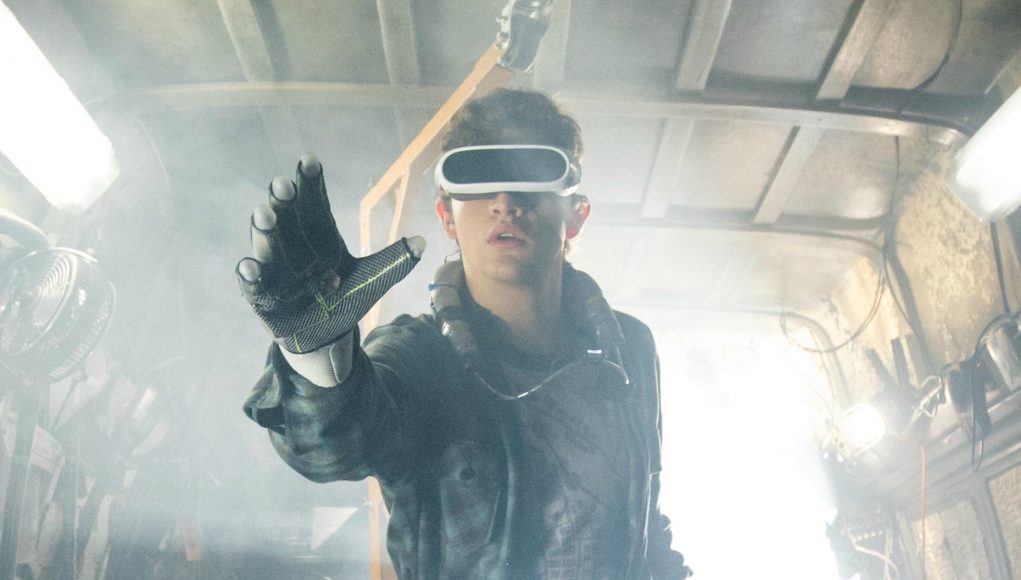Virtual reality (VR) has been a hot topic in the media and the tech sector for the last couple of years, but it is about to hit a new level of buzz, thanks to the internationally best-selling book Ready Player One (2011) by author Ernest Cline, and movie adaptation from award winning director, Steven Spielberg, premiering in theaters today. The Ready Player One (RPO) novel is often cited by industry experts as one of the top recommendations for VR-related book lists. The story’s primary backdrop is a world where VR is intertwined into every aspect of our daily lives, what I call a ‘VR-First future’. RPO follows the adventures of a teenager and his friends as they overcome untold challenges on their quest to win a global online scavenger competition and its gigantic prize.
Guest Article by Alvin Wang Graylin
Alvin Wang Graylin is the China President of Vive at HTC leading all aspects of the Vive/VR business in the region. He is also currently Vice-Chairman of the 300-member company Industry of Virtual Reality Alliance, President of the $15 Billion Virtual Reality Venture Capital Alliance, and oversees the Vive X VR accelerator in Asia. He has had over 22 years of business management experience in the tech industry, including 15 years operating in Greater China. Prior to HTC, Graylin was a serial entrepreneur, having founded four venture-backed startups in the mobile and internet spaces, covering mobile social, adtech, search, big data and digital media. Additionally, he has held P&L roles at several public companies.
Note: Vive is the official VR partner for the upcoming Ready Player One film.
Update (3/29/18): With today’s premiere of the Ready Player One movie, Graylin has added some additional thoughts to this article, originally published in August, 2017, after screening the film.

I was fortunate enough to have gotten access to see the early preview of the film a couple of days ago and am happy to report that it’s a delightful film that keeps the audience on the edge of their seats for over two hours. I was originally a little concerned that the extensive references to 80’s American pop culture and complex topics related to the technology would make the film hard to appreciate for global audiences, but Spielberg has again worked his magic and found ways to give it appeal to audiences of all ages and cultures. Even in the film preview night in Beijing, the audience seemed to cheer and laugh at all the right moments, and every face coming out of the cinema bore big smiles.
The impact of this movie will go far beyond an entertaining evening for the audience. It’ll go a long way toward making VR better understood by the general public around the world and, just as important, help normalize VR headsets. I’m sure the actual VR devices of 2045 will be far less bulky that what’s depicted in the movie, but I’m actually glad Spielberg decided to use more current day form factors in the film as this will help general consumers better related and accept current devices. I’m excited to see how RPO will change the growth/adoption trajectory of the VR industry. For those that have only watched the movie, but haven’t read the book, I’d still recommend going back and reading it to get a deeper view. Both are enjoyable in different ways.

Although some would describe the world of 2045 depicted in RPO as a bit bleak or dystopian, I would argue that there are numerous positive lessons we can glean from this envisioned future world that should give us hope and guidance. In fact, I have asked everyone in the China Vive team to read the RPO book and that our HR department give all new staff a copy of the book as there are so many relevant concepts and use cases I believe all can benefit from. Given it is a fictional story written more to entertain than educate, there are a number of technical details I may not fully agree with, so let us not take all the content too literally as some technical readers can tend to do. On a whole, RPO is surprisingly insightful for a novel about a technology that has the potential to create truly transformative impact on our future lives.
I was first exposed to VR over 25 years ago and as most involved in the HIT Lab, we saw its potential from our very first experience. Over the last 1.5 years in my current roles with VIVE, Vive X, IVRA and VRVCA, I’ve had the opportunity to evaluated hundreds of immersive computing products/content, reviewed thousands of VR startup companies and given exposure to the industry’s long-term roadmap. I have tried to take those learnings into account when providing my takeaways from the RPO story. This book and its future adaptations into other media will make the concept of VR accessible for a mass audience, in turn helping bring broad understanding of VR to the general public.
RPO will do for VR what Avatar (2009) did for 3D in general awareness. A form of the ‘VR-First’ future from the book will become a reality in the not too distant future, and the RPO will play an instrumental role in accelerating its realization. What form of the future is finally realized is ultimately up to us as a people, and how we decide to leverage the potential of this disruptive technology.
To help both our internal team and the broader public better understand the takeaways from the story, here is my summary of the key points from the book we can use to guide our actions in the near to mid-term to create a more positive future. It can also be used as a guide to highlight potential business opportunities for budding VR entrepreneurs. This list is not intended to be exhaustive, it’s only the ones I wanted to highlight at this time. I welcome all readers to append other lessons they think worthwhile in the comments section.
Spoiler alert: I have tried to make book references vague enough not to reveal the plot of the book in these learnings, but it may provide hints to the plot. So if you want a pure reading experience of the book, best you go read the book before reading the rest of this article.
16 Key Takeaways from the Ready Player One Novel
1. We will be more dependent on VR devices than we are our phones today
It is clear from the story how VR can be applied to all aspects of our lives from work to school to play, and is our key access point to all information we would ever need. Given that essentially no other devices are mentioned in the book, it shows the potential for a future world to have replaced all other screens/interfaces with VR devices. For those not yet familiar with VR, it’s probably worth you and your family’s time to go find a VR arcade to try some high-end VR or at least pick up a mobile VR shell to get acquainted with low-end VR.
2. VR may play a bigger role in our future lives than AR
Many analysts have forecasted that AR applications could outpace VR in the future. I believe the two technologies will naturally meld together over time into an integrated experience materialized on a single device, so there’s no real need to so clearly delineate. Some early high-end VR devices already have such capabilities built-in. However, it is notable that in the book, very few AR type use cases were actually cited. Which does make sense when most people in a VR-first future can live a large portion of their lives without leaving their homes, their dependency on AR applications will actually be less frequent than their VR requirements. Developers should take some time to start thinking about how AR concepts and technology can be applied to enhance VR experiences and vice versa.
3. Network speeds and cloud computing capacity will be the key utility of the future
In a world where most our interactions with the world are via a VR device, connectivity/computing speeds will impact our lives more than other utilities we care about today, i.e. water, gas, electricity. 5G, fiber-to-the-home and server farms will be increasingly important to our daily lives. In fact, without VR proliferation, the impetus for these capabilities becomes much less. In this future world, we will prefer to be without water or gas for an hour vs. than without constant high-speed connectivity. Startups looking into cloud computing capabilities that fully leverage the coming fat/fast data pipes to deliver innovative services could reap huge rewards in the future.
4. Everyone will become ‘Gamers’ & watching game streams will be a major pass-time
According to Mary Meeker’s recent Internet report, in 1995 there were 100 million gamers, and today, there are 2.6 billion. In the VR-first future, much of our lives will have become ‘gamified’ in a virtual world and we will essentially all be gamers. Games today is often seen as an activity that wastes times and produces little economic value. In the VR-First future, that is no longer the case when gamified work and education can make our careers more enjoyable and help use learn in new ways.
E-sports has become a phenomenon over the last few years, and its gaining momentum as more and more people spending their time playing online games and watching others compete for large cash prizes. In the book, the entire story unfolds around the playing of the largest e-sport game imaginable where essentially the entire globe is playing a single game in an effort to win the ultimate prize and hundreds of millions of users are watching real-time updates via live game streams. E-sport athlete avatars will become more famous than real-world celebrities. In fact the VR-First world, the most famous movie stars of the future, may not even be real people.
5. Virtual Schools will democratize high quality education to the world
I deeply believe that our education model can be revolutionized by VR technology and quality education made universally accessible. Quality and quantity of education has been directly linked to one’s career success and income. In the VR-First future, every child (and adult) will have access to the best school/teachers. The planet Ludus where all children can get access to quality education via VR is a potential model that does make sense. Governments giving free VR equipment to all students worldwide to learn in virtual schools can actually be far more economical than operating physical schools around the world. Studies have already shown VR can help kids learn more and retain information longer vs. traditional teaching. Vive is already working with hundreds of schools and universities around the world to pilot VR educational methods as well as building education-focused tools and content. School administrators and governments need to start looking into how to better leverage VR to teach our future generations now.
6. Remote work via VR will become the norm
Most of the work and meeting scenarios described in the book took place in VR equipment. Although physical offices were mentioned for certain companies, given all the actual interpersonal interactions actually took place in the virtual world, we can derive that the physical need to be in the office really doesn’t exist for most cases. Think of how much time we can regain in our days be eliminating the need for commuting and business travel. Even today, many industries such as design, engineering and healthcare have already show significant increases in productivity by conducting a significant portion of their work in VR.
7. VR can erase race and gender inequality gaps
In the book, one of the characters disguises his/her race and sex by selecting an unmatched appearance in the chosen avatar in an effort to avoid the innate negative biases that exists in our society. When most of our interactions with others are conducted via our avatars, we truly can allow people to be judged solely on our creativity and intellect vs. our physical traits or social status. In our world today, females and minorities generally earn ~20% less for the same role. In the VR-First future, that doesn’t have to be.
8. Gathering experiences and access will be more important than gathering wealth
When we can have any life we want in the virtual world, gathering physical possessions becomes less important and so does gathering monetary wealth. What affects our personal or social status in the VR-First future will be our experience level granting us greater influence and access. Even in the current world, why not take guidance from the future and spend more of our time/money on life experiences vs. material goods.
9. Virtual currency will become more relevant to our lives than traditional currency
Cash today is already becoming obsolete in places like China where you can effectively live fully via only mobile payment. In the VR-first future, traditional national currency itself may also go away entirely in our daily lives, replaced by completely digital currencies such as bitcoin. This future will come much faster than we think and create massive opportunities for entrepreneurs in the fintech world.
10. A huge economy is coming for virtual goods and services
As our time spent moves increasingly from the physical world to the virtual world, virtual items and services will become a much larger part of our lives. The money we spend today on travel, entertainment, education, transportation, apparel, etc will largely move to the virtual economy. Examples of such cases were frequently cited in the book where users had to pay for virtual travel or buy virtual powers. We already see that trend happening already today where hard-core gamers and live stream audiences put a large part of their discretionary spending on virtual goods/services.
11. Home food delivery may become the most common way to eat
Even when we spend most of our time in the virtual world, there is one physical thing we will still need to do, eat! As our homes get smaller and the need to go outside reduces, the need for food delivery will increase dramatically. In Mary Meeker’s recent report, she cited US home food delivery growing at 45% YoY, and in China, that number is even higher where in most cities, customers can get essentially free delivery of food from any restaurant in about 30 minutes. I have my dinner delivered more than 50% of the time when I’m actually in Beijing. Low-cost high-speed food delivery can be an opportunity globally.
12. VR platforms should put in safe guards for managing physical health into future systems
As users spend more of their days inside the virtual world, many will worry that there will be negative health consequences. In the book, Wade turns on a system function that requires users to perform sufficient physical exercises before he can login to his VR rig. This kind of feature is less needed with room-scale VR system like the Vive, which already provides plenty of activity, but there certainly will be a market need over time for such functions. Given all the sensors and wearables that will be integrated into VR devices in the coming years, it’ll be quite easy for the systems to intelligently ensure that users have both an enjoyable and healthy experience.
13. VR can make physical distance irrelevant in our daily lives; VR natives may never meet their best friends in person
During the majority of the book, all the main characters were located physically apart from each other, and some were even constantly mobile in the physical world. However, in the virtual world, their interactions were seamless and relationships unaffected. Being able to effectively live, work or study from any location gives us a newfound freedom never afforded us in the past. This is going to have dramatic impact on the real-estate market as location will no longer be the key factor in choosing a home or office.
In the book, best friends and even siblings had never actually met each other in person, but they had the emotional connections we would expect from people who grew up together. In the VR-First future, interpersonal relationships will be redefined as we build deep friendships based on the substance of others’ souls and digital records of their lives vs. physical appearance/social status. We can already see this trend happening now for online friendships built upon connections in social networks around the world today.
14. Privacy and data security will be critical to enable an acceptable VR-First future
RPO describes a world where essentially all users’ data are centrally kept online and nearly all interactions with other people will happen online and can be tracked. In such a world, information security and access control becomes even more critical than ever. Our avatar identity is our key to the world and how that ID integrates with all facets of our lives will not be an easy problem to solve. We will also need the ability to create anonymous identities to allow users to confidently utilize these centralized system without fear of being unknowingly tracked or our personal data being abused. These are all opportunities for security minded firms today.
15. VR can reduce our ecological footprint to enable a more sustainable environment
As the earth’s population continues to grow, our natural resources continue to be depleted, and our environment is increasingly impact climate and health, it’s clear something needs to be done. Mass adoption of VR may offer a long-term solution for us to naturally reduce our drain on limited resources. We would need to travel less, commute less, reduce the need for most office buildings, live effectively in smaller homes, and be geographically distributed in a way to lessen environmental impact. If we accomplish these things in a global scale, there’s a good chance we can reverse the damage we’ve done in the last hundred years and create a truly sustainable planet. Although in the book, the global environment wasn’t in great shape, if we take the right actions over the next 20-30 years, our real-world future can be much different.
16. Even in a virtual world of abundance, humans still have a need for greater purpose
When we do arrive at the VR-First world, it should seemingly satisfy the natural human drive for happiness by giving us access to any experience/object we can dream of, but clearly the population of the RPO future still were not satisfied. They needed the quest in the story to drive themselves forward. Humans differ from other animals in that we strive for more than just survival and pro-creation. We need to have a sense of purpose and it’s this purpose that drives us to excel and achieve more. I challenge all those who read this article to take on the purpose of taking part in realizing a positive VR-First world and giving our future generations a planet we can all be proud of. Whether the future is utopian or dystopian, it is really in our hands.








